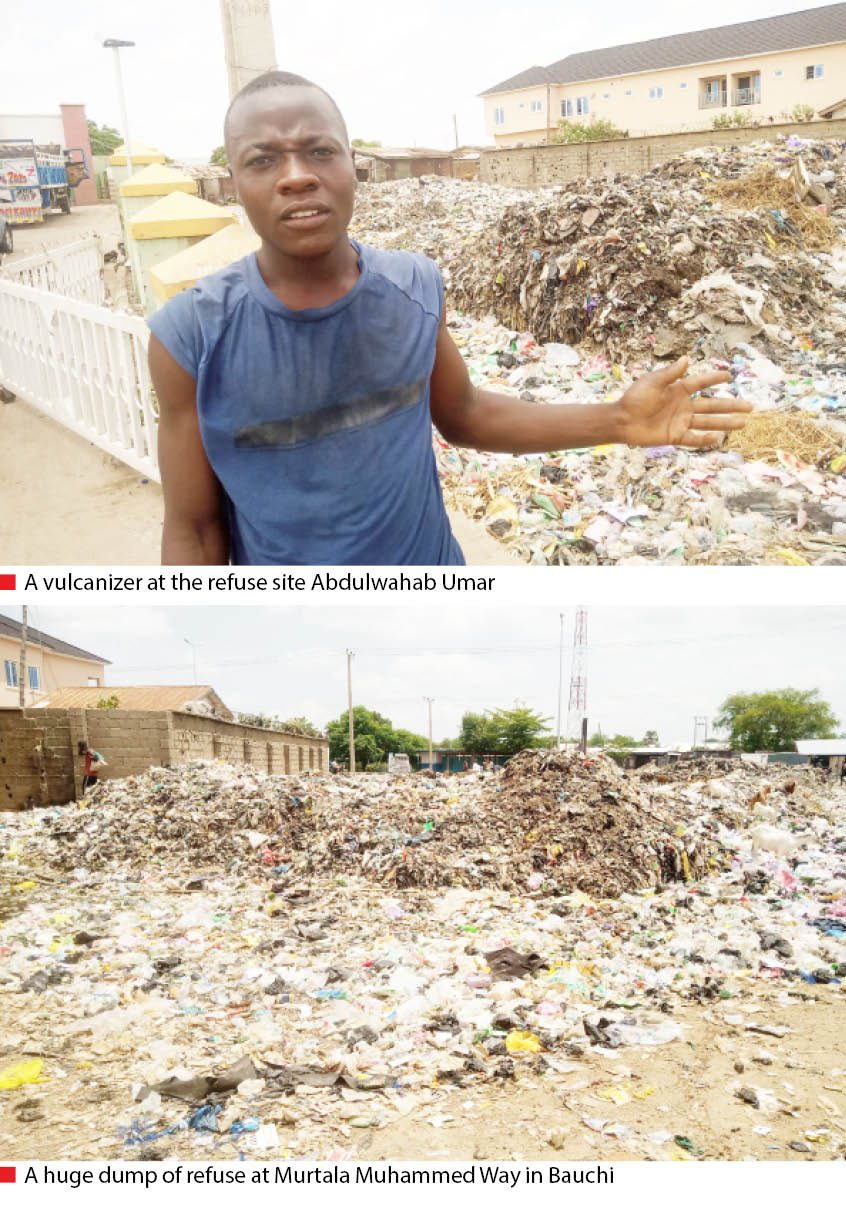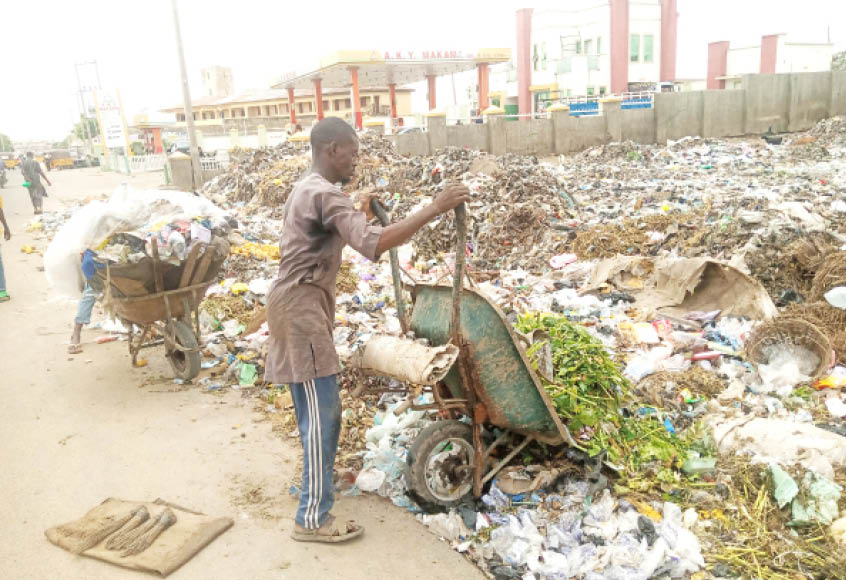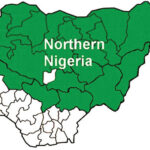A huge refuse dump located at the Murtala Muhammed Way along Muda Lawal market in the Bauchi metropolis has turned out to be a source of livelihood for scavengers and dozens of vibrant youths who generate income daily transporting refuse in their wheelbarrows from the market to the refuse site.
The refuse site, which has lasted for more than 10 years, and extends to the popular Bayan Gari area of the metropolis, has exposed residents to health and environmental hazards as well as an offensive smell that pollutes the area.
A vulcanizer who works at the entrance of a filing station, Yakubu Aminu, popularly known as Manager Mai Faci, said the refuse site predates the filing station. “I started working here seven years ago and I met this refuse here. I don’t know why the refuse has not been evacuated completely but the Bauchi State Environmental Protection and Sanitation Agency (BASEPA) has been coming to evacuate a fraction of the refuse and leaving the remaining almost on monthly basis.”
A trader in the area, Abdulwahab Umar, told Daily Trust Saturday that the refuse posses life threatening health and environmental hazards to residents, not to talk of the offensive smell which pollutes the air.
- Ogun: Thugs disrupted voting in 99 units, Adebutu tells tribunal
- Drug abuse, cultism fuel insecurity in Lagos communities

“We need urgent government intervention to evacuate the refuse before the possible outbreak of diseases. We are appealing to the state government to come to our aid and relief us from this dangerous trend by evacuating the refuse and also providing an alternative refuse collection centre,” Umar said.
A resident of Bayan Gari, who is also a food vendor in the area, Maman Ene, lamented that the refuse has become a source of concern for over 10 years.
“Last year, we teamed up and visited the BASEPA to help us evacuate the refuse and they promised to clear it but unfortunately, they just evacuated a part of the refuse.”
Maman Ene said that another challenge posed by the refuse site, especially during the rainy season, is that water accumulates there, giving room for mosquitoes and other rodents to breath and thrive. “We are pleading with the government, in the name of God, to come and evacuate this refuse for us. They can construct a dump site or bring containers where people will be dumping their refuse to forestall an outbreak of diseases.”
Meanwhile the refuse has also offered opportunity for some youth to make a living. A 30-year-old wheelbarrow pusher, Mamman Alhaji Musa, told Daily Trust Saturday that he is among the youth who sweep and evacuate waste from Muda Lawal to the refuse dump site at the Murtala Muhammed Way for a stipend.
“Individual traders give us between N20 and N100 if we sweep and evacuate the waste from their shop or location in the market. It’s from this that we earn a living. In a day, I make about five to seven trips which generates between N700 and N1,000 daily,” Musa said.
Another wheelbarrow pusher Musa Umar corroborated his colleague, saying, “I was a former staff of Bauchi Local Government Area. After spending 13 years in service, we were disengaged by Governor Isa Yuguda’s administration in 2007 without pension or gratuity. A good friend bought me a wheelbarrow because I didn’t want to remain idle, I engaged myself in sweeping and evacuation of waste to feed my family and take care of pressing needs,” Umar said.
Scavengers are also beneficiaries from the refuse dump. Seventeen-year-old Isa M. Abubakar said the refuse site has become a source of livelihood for scavengers who go there in search of plastic bottles, empty cartons and rubber within the waste.
“On a daily basis, I and some other youths who believe that scavenging is better than stealing visit this dump site to scavenge for plastic bottles, rubber and other stuff which we sell to feed ourselves and support our families. This refuse dump has been a source of livelihood for many young men. I generate between N2000 and N3000 depending on the number of bottles or items I get.”
For 14-year-old Ibrahim Abbas, “We use what we generate from here to buy clothes and give the remaining money to our parents to support family. I am now is JSS 1 at Magaji Quarters and when we close from school, I pick my empty sack and move to the refuse dump for scavenging,” Abbas said.
Shuaibu Ibrahim, 25, said he has spent six years hustling around different refuse dumps in the metropolis, “Many people look down on me doing this job but I don’t have any regrets. I am saving and I hope some day to leave scavenging and start a small business.”
When contacted, Director General of the Bauchi State Environmental Protection and Sanitation Agency (BASEPA), Dr Ibrahim Kabir, who also doubles as Project Coordinator Agro-Climate Resilience in semi-Arid Landscape (ACReSAL), said that BASEPA is saddled with the responsibility of waste management across the 20 LGAs of the state.
“That is one of the most challenging waste collection centres we have in Bauchi, for two reasons. One, when you look at communities that are bringing their waste, including the Muda Lawal market, and two, when you look at the nature of the place in terms of being a waterlogged area. Another factor is the fund required to make that place suitable for dumping of waste. That is why we go there every two days, even if we’re not able to evacuate it all, at least we go there to reduce the quantity. The challenging is because the area is waterlogged, people cannot enter in to dump their waste, so sometimes they dump the waste by the roadside,” Kabir said.
“I assure you that the area is one of our priorities, with whatever intervention we have gotten, we will make sure it is being constructed because what is expected from us is to construct a standard collection centre. We also sensitize the people and ensure that they comply by dumping their waste at the appropriate point.
“We have lots of challenges and I want to attribute the challenges to the attitude of the people because more than 70 to 80 percent of environmental challenges are attitudinal based.
“We are in the process of coming up with the Bauchi State environmental management plan and one of the segments is the waste management plan. In that, we were able to come up with solutions to each type of waste, both in the urban and the rural areas.”
The DG explained, “Just like in other states, we have issues in terms of the municipal solid waste management, particularly in Bauchi metropolis where we have the highest population in the state. There is relationship between income and generation of waste. As the income is growing, the generation of the waste will also grow together.”
The DG said, “We came up with two models, one of the models for the organized and accessible areas. We had to cancel all the waste collection there so that government will not be responsible for the evacuation of their waste and engaged the private service providers there and the residents of the area must be responsible for their own waste management. The government will play the role of mediating and moderation between the service providers and households. Through that, we were able to cancel 69 waste collection centres and left with only 49 centres now.”
Kabir added, “In each of the communities that we cancelled these centres, we brought service providers and certified about 23 companies to be collecting the waste from the households at their door step and we tried to intervene at the initial stage to subsidise the registration and also subsidise the collection for the first six months. We asked the providers to collect N1,000 and the agency arguments N500 per month.
“We now have 49 waste collection centres; some of which are constructed in a manner that the communities are been protected. An example is when you go to Kwallaga, we have constructed a waste collection centre which we consider as effective. We have one in Railway, one in Bakin Kura, and recently constructed one in Illelah which is entirely a different model where we have a room for scavengers so that they can do their business from the waste that is been dumped there.
“We have problem in most of the collection centres because people don’t enter into the real space but just dump their waste by the side of the road. We know how many days it takes for each of the collection centres to filled up and we have timetable and frequency for evacuation for each of the collection centres,” the DG added.

 Join Daily Trust WhatsApp Community For Quick Access To News and Happenings Around You.
Join Daily Trust WhatsApp Community For Quick Access To News and Happenings Around You.


